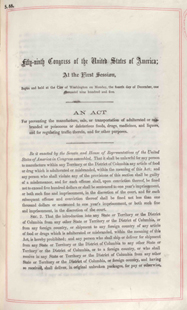The passage of the 1906 Food and Drugs Act was a hallmark of the Progressive Era and represented the first comprehensive federal food and drug regulation in the United States, giving the federal government authority to act in the case of adulterated or misbranded drugs. Adulterated foods and medicines, as well as fraudulent claims on patent medicines, had become widespread. Women's clubs, journalists, physicians, and pharmacists had campaigned for decades for the passage of consumer protection laws. Harvey Wiley was one of the 1906 act's greatest champions. His "Poison Squad" of volunteers, who tested food preservatives, and his lobbying as head of the Bureau of Chemistry of the United States Department of Agriculture (USDA) were major factors in gathering the support needed to pass the 1906 act.
USP's chairman, James Beal, was a prominent member of the Food and Drug Congress that composed the actual legislation and was directly attributed with writing much of the final bill. The Bureau of Chemistry had the responsibility of carrying out the law. As in the 1848 Drug Importation Act, USP was recognized as the official standard for strength, quality, and purity, along with the National Formulary, and drugs sold under or by a name recognized in these compendia now were legally required to meet their standards. Beal insisted on the inclusion of a variation clause, which allowed drug manufacturers to use official titles on products that differed from these official standards, as long as the deviation from the official strength, quality, or purity standard was clearly labeled on the product.

1906 Food and Drugs Act

